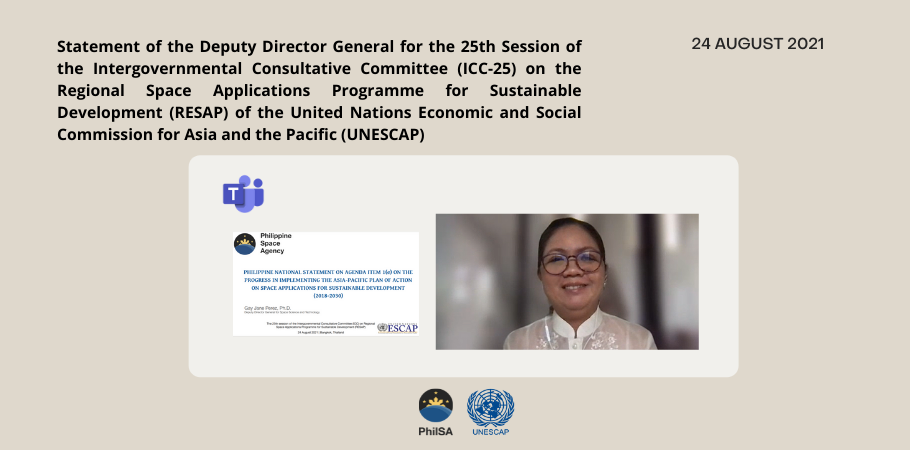Philippine Space Agency (PhilSA) Deputy Director General Gay Jane P. Perez delivered the Philippine National Statement under Agenda Item 1(e) on “The Progress in Implementing the Asia-Pacific Plan of Action on Space Applications for Sustainable Development (2018-2030)” on 24 August 2021 during the 25th Session of the Intergovernmental Consultative Committee (ICC-25) on the Regional Space Applications Programme for Sustainable Development (RESAP) of the United Nations Economic and Social Commission for Asia and the Pacific (UNESCAP).
The statement highlighted how the Philippines leverages prior and ongoing programs on satellite development and in mobilizing space data for digital inclusion, economy, and government in collaboration with international partners in support of the Asia-Pacific Plan of Action on Space Applications for Sustainable Development for 2018-2030 and national objectives. These programs include the development of the Multispectral Unit for Land Assessment or MULA satellite, the COVID-19 Space Data Dashboard, the decadal survey, and upcoming initiatives in partnership with RESAP Member States. These programs aim to increase the capabilities and benefits of space technology and applications toward empowering the government and the people in assisting critical sectors. Furthermore, Dr. Perez expressed the country’s support for the initiatives of the RESAP and the collaborative initiatives of its Member States.
Dr. Perez led the Philippine Delegation in this forum. She is joined and supported by representatives from PhilSA. PhilSA formally represents the Philippines as the national focal point for the RESAP.
25TH SESSION OF THE INTERGOVERNMENTAL CONSULTATIVE COMMITTEE (ICC-25) ON THE REGIONAL SPACE APPLICATIONS PROGRAMME FOR SUSTAINABLE DEVELOPMENT (RESAP)
PHILIPPINE NATIONAL STATEMENT
AGENDA ITEM 1(e) “THE PROGRESS IN IMPLEMENTING THE ASIA-PACIFIC PLAN OF ACTION ON SPACE APPLICATIONS FOR SUSTAINABLE DEVELOPMENT (2018-2030)” | 24 AUGUST 2021
delivered by
GAY JANE P. PEREZ
DEPUTY DIRECTOR GENERAL OF THE PHILIPPINE SPACE AGENCY (PhilSA)
Co-chair and distinguished delegates,
The Republic Act 11363 or the Philippine Space Act, signed by President Duterte in August 2019, created the Philippine Space Agency or PhilSA. It serves as the central government agency addressing all national issues and activities related to space. The law provides a framework for the Philippine Space Policy that will enable the country to become a truly space-capable and space-faring nation, specifically identifying six key development areas for this purpose which are: National Security and Development, Hazard Management and Climate Studies, Space Research and Development, Space Industry Capacity Building, Space Education and Awareness, and International Cooperation.
In support of the Asia-Pacific Plan of Action on Space Applications for Sustainable Development for 2018-2030, the PhilSA leverages on the prior initiatives and programs of the Department of Science and Technology (DOST) to continue developing nano- and microsatellites in collaboration with our international partners and in mobilizing space data for digital inclusion, economy, and government. Since 2016, the Philippines has already deployed a total of four satellites into space: Diwata 1 and 2 and Maya 1 and 2. As we continue to advance our satellite and applications development programs, we also develop and capacitate our Filipino engineers and scientists. By sustaining and continuously developing this crucial interlinkage between people, capabilities, and infrastructure, we are headed towards what we envision on both national and global dimensions. Currently, PhilSA is working on its next generation satellite, the “Multi-Spectral Unit and Land Assessment” or MULA. MULA is a multispectral, wide swath, medium resolution imager that can serve diverse applications including food and national security, disaster management, and environmental monitoring.
The Philippines also recognizes the significant role of space technology in post-pandemic recovery. The Space Data Dashboard was jointly developed by the PhilSA and the DOST to analyze and compare various datasets to assist in monitoring the socioeconomic and environmental impacts of the COVID-19 pandemic. Through the use of artificial intelligence combined with remote sensing techniques, we have been able to come up with a more efficient way to monitor and study various human activities and the environment.
Furthermore, to bolster our capabilities and the benefits we derive from space technology and applications, empowering our people and government in vital and critical sectors, PhilSA is undertaking its decadal survey on space science and technology with key stakeholders in the Philippines. This survey is expected to produce recommendations based on the assessment of the Philippines’ current capacities and future needs in Earth observation, Communications and Navigation, and Security and Defense.
Co-chair and distinguished delegates,
PhilSA continues to recognize the enabling role of international cooperation in our activities. PhilSA hopes to elevate its role in realizing the 2030 SDGs and our national objectives. In this regard, we look forward to engaging in local and global initiatives in support of the Plan of Action. We assure the Regional Space Applications Programme of the UNESCAP of our continued participation, cooperation, and support, as the new focal agency for the Philippines in this distinguished body. In this context, we are appreciative of UNESCAP and South Korea for involving us in the Pan-Asia Partnership for Geospatial Air Pollution Information or PAPGAPi Project, and we hope to collaborate with all RESAP Member States in similar initiatives moving forward.
In conclusion, the Philippines believes that sustainability is a global effort. Hence, PhilSA endeavours to build upon the momentum of the aforementioned developments to achieve one common goal: to sustain our planet by strengthening the consideration and prioritization of the uses of space applications in diverse sectors in the Philippines, in the Asia-Pacific, and for all humanity.
Thank you very much.
— END —




